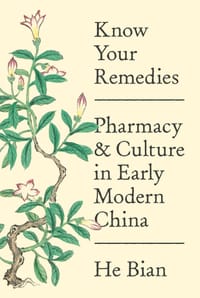Know Your Remedies presents a panoramic inquiry into China’s early modern cultural transformation through the lens of pharmacy. In the history of science and civilization in China, pharmacy—as a commercial enterprise and as a branch of classical medicine—resists easy characterization. While China’s long tradition of documenting the natural world through state-commissioned pharmacopeias, known as bencao, dwindled after the sixteenth century, the ubiquitous presence of Chinese pharmacy shops around the world today testifies to the vitality of Traditional Chinese Medicine. Rejecting narratives of intellectual stagnation or an unchanging folk culture, He Bian argues that pharmacy’s history in early modern China can best be understood as a dynamic interplay between elite and popular culture.
Beginning with decentralizing trends in book culture and fiscal policy in the sixteenth century, Bian reveals pharmacy’s central role in late Ming public discourse. Fueled by factional politics in the early 1600s, amateur investigation into pharmacology reached peak popularity among the literati on the eve of the Qing conquest in the mid-seventeenth century. The eighteenth century witnessed a systematic reclassification of knowledge, as the Qing court turned away from pharmacopeia in favor of a demedicalized natural history. Throughout this time, growth in long-distance trade enabled the rise of urban pharmacy shops, generating new knowledge about the natural world.
He Bian is assistant professor of history and East Asian studies at Princeton University.

